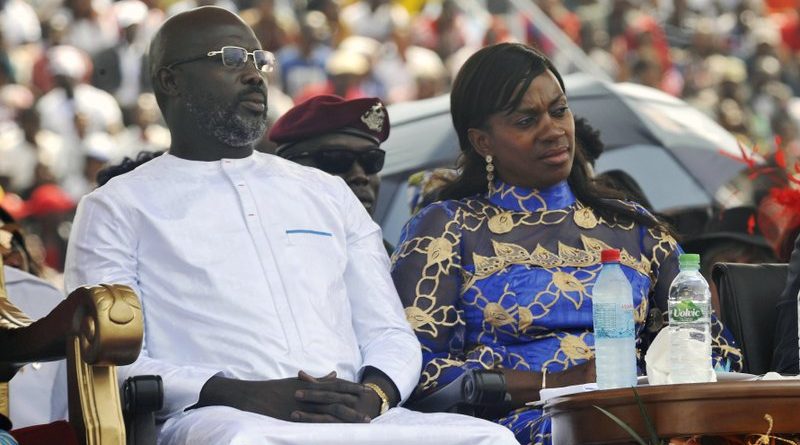Missing billions, losing patience: Liberia probe targets former officials
On 26 August, five former central bank officials pleaded not guilty to charges of money laundering and economic sabotage in a scandal related to the illegal printing of over $2.6 billion Liberian dollars ($16.3 million).
The accused include the former executive governor of the central bank, Milton Weeks, and his former deputy, Charles Sirleaf. They had previously been arrested over the reported disappearance of over L$15.5 billion (about US$100 million) in newly-minted Liberian currency, which occurred when they were in charge of the bank.
These high-profile arrests are part of President George Weah’s promise to tackle corruption. The 52-year-old former footballer came to power in January 2018 vowing to break with the past and end government graft, but was wrong-footed a few months into his presidency when reports emerged that L$15.5 billion in freshly-printed notes had vanished in 2016-17. Questions were also raised about L$25 million injected into the economy under his own administration.
Two reports were commissioned to investigate these matters. One was conducted by risk advisory firm Kroll and backed by USAID. The other was commissioned by the Liberian government and carried out by the Presidential Investigative Team (PIT). Both found huge irregularities in the processes by which the money had been printed and distributed. Their probes were unable to account for several billions of Liberian dollars.
Former officials on the radar
This June, thousands of Liberians took to the streets to protest against corruption and the country’s economic decline under Weah. Amidst this pressure, the president set up a wider anti-graft probe and special prosecutor to review audit reports dating back ten years. The newly-formed Assets Investigation, Restitution and Recovery Team (AIRReT) was tasked with focusing on the 12-year administration of former President Ellen Johnson Sirleaf and recovering $4.6 billion in allegedly missing assets.
This AIRReT has already targeted several individuals who were officials under Weah’s processor. Sirleaf’s son Charles has been charged and arrested, while the special prosecutor in July released a long list of “persons of interest”. Those named are largely former Sirleaf officials including several well-known former ministers.
Some of the officials listed have refused to appear before the AIRReT and have even threatened legal suits in response to being named. Many have accused the probe as being a politically-motivated witch hunt with little basis in fact or evidence. Former finance minister Amara Konneh issued a letter to AIRReT, accusing it of issuing “unsubstantiated speculations, street gossips and media reports implicating me in some unnamed offense”.
“I deem your approach to the conduct of this investigation to be unjust to pass the test of a witch-hunt,” he wrote. “You have not disclosed the basis upon which you have summoned me and yet expect me to appear on very short notice to present myself and answer questions that may require very detailed responses complete with relevant documentation.”
Former President Sirleaf, who is not listed as a “person of interest” but could be called in for questioning, has also strongly defended her son, insisting that that he had been “unjustifiably, illegally charged”.
As well as those directly implicated, some commentators are also questioning the motivations behind Weah’s anti-corruption campaign. Some see the targeting of ex-Sirleaf figures as a way to distract attention from scandals that have occurred under the current government.
“President George Weah ordered $25 million to be infused in our economy some time ago, but up to today his Central Bank governor and Finance Minister cannot properly account for the money,” says political analyst James Rogers. “How can we believe you are serious to recover stolen funds when you cannot account for what you already have?”
These concerns have led to scepticism over AIRReT’s request to be allocated $2.1 million in the 2019/2020 national budget. Many Liberians want to see action taken on corruption, but question whether this is the best use of funds when the government has been struggling to pay civil servants for months.
“The government is noted for always losing cases,” says Samuel Lombeh, coordinator of the civil society group Governance Forum. “How are we sure that after spending all these funds we will not end up with empty cases? I think we have a lot of things to look at right now as a country and not to give our attention to a PR stunt.”
Losing faith
These issues are unfolding against a backdrop of increasing popular frustration in Liberia with the current government. When Weah took office, many Liberians were filled with hope, but much of this has turned to disillusionment. This led to mass protests against the president in June. Meanwhile, Weah’s party lost a local by-election in Montserrado County, a ruling party stronghold, in July. As he struggles to fight corruption, Weah is facing increasing pressure from citizens who say they have endured even more hardship under him than his predecessor.
“The president has said over and over that he will fix the economy but we have not seen any improvement up to present,” says Amara Kamara, a student at the University of Liberia. “Instead, we are seeing a decline in the economy day by day.”
At a recent economic dialogue held in the capital Monrovia, Weah promised to turn things around again and said his government would implement policy measures strategies and programmes to enhance a speedy economic recovery and sure sustained growth. For now though, many are losing patience and are yet to be fully convinced by Weah’s anti-corruption campaign.
OTHER VIEWPOINTS: African Arguments
Stephen D. Kollie is a freelance Liberian journalist based in Monrovi

